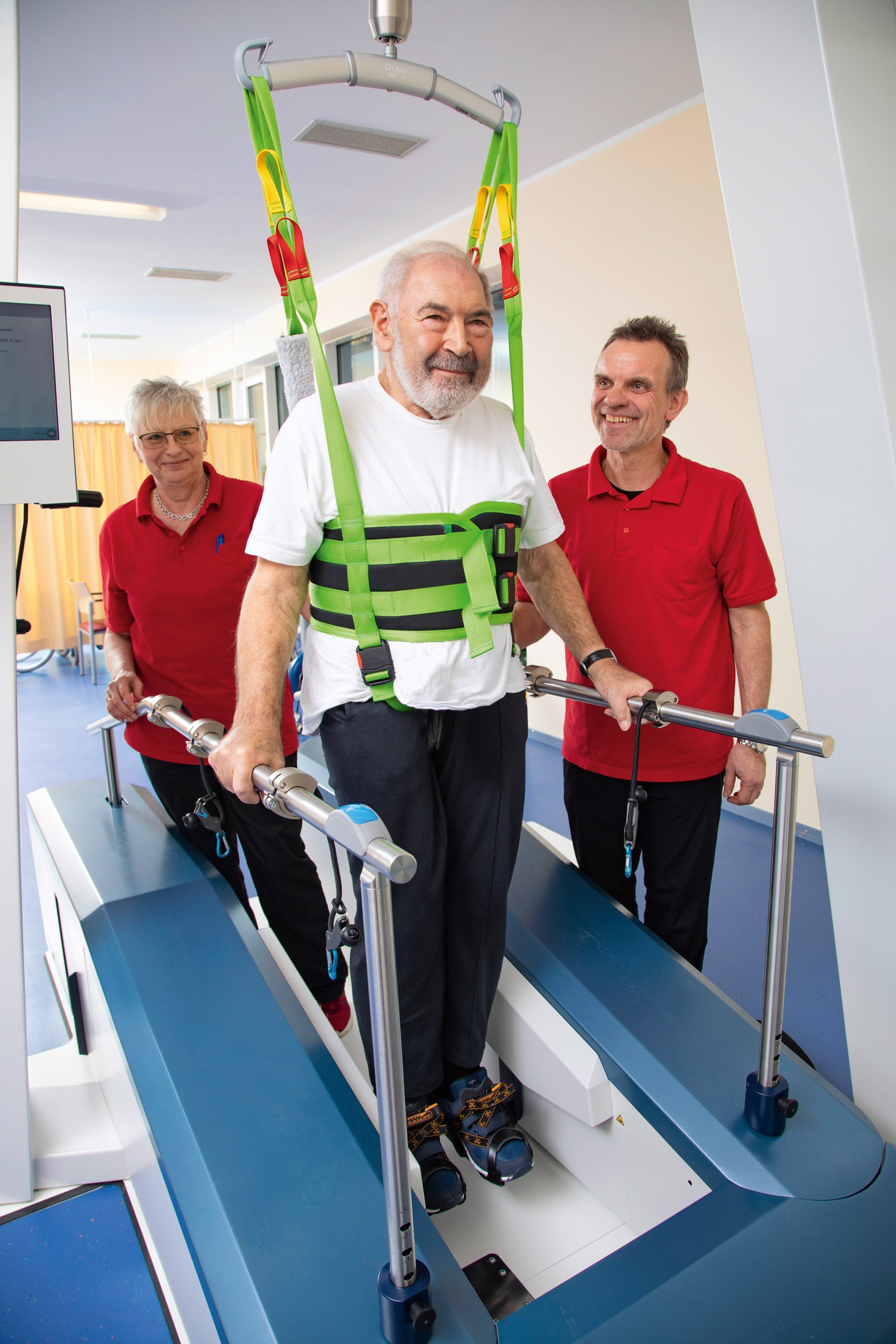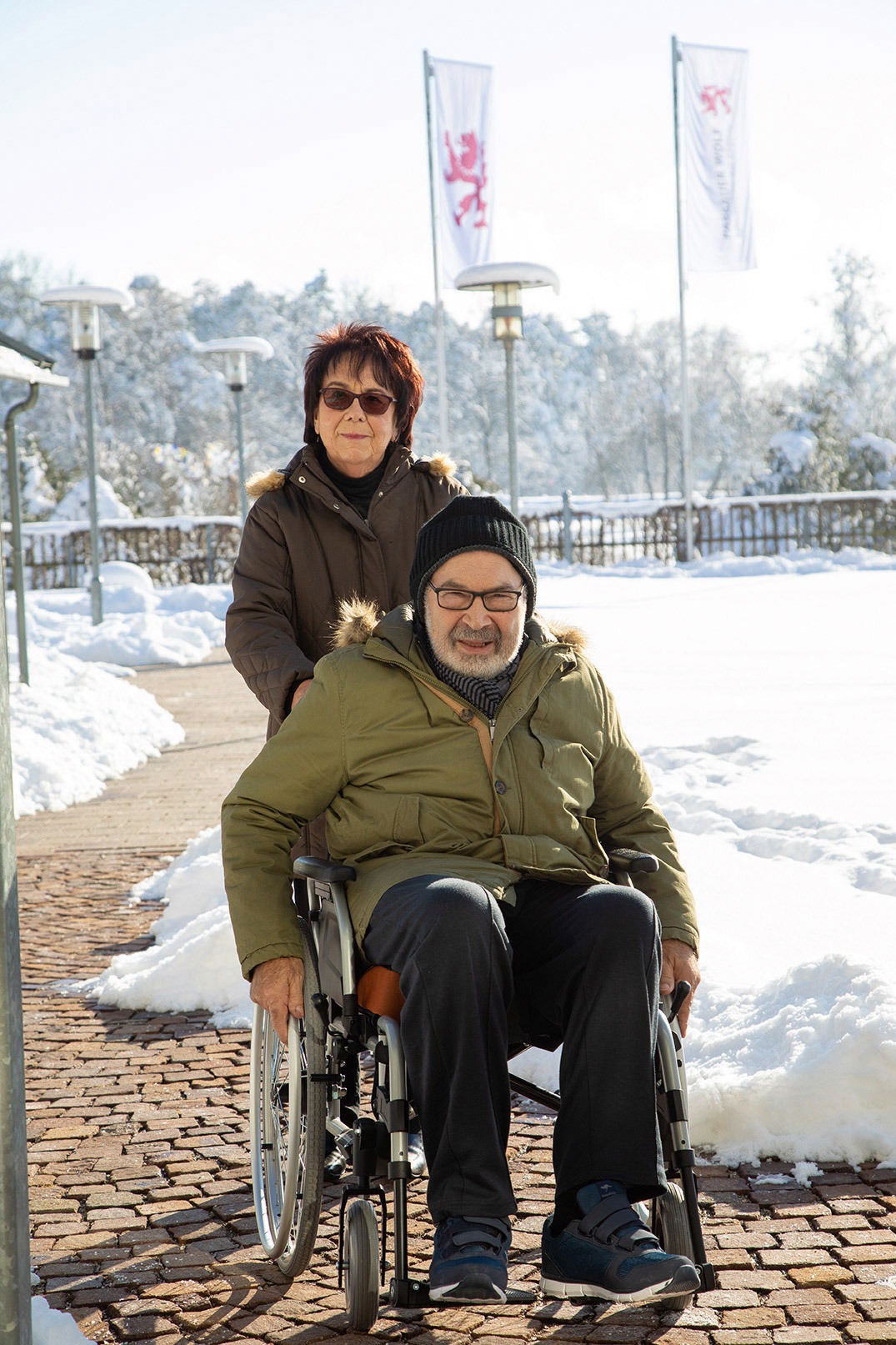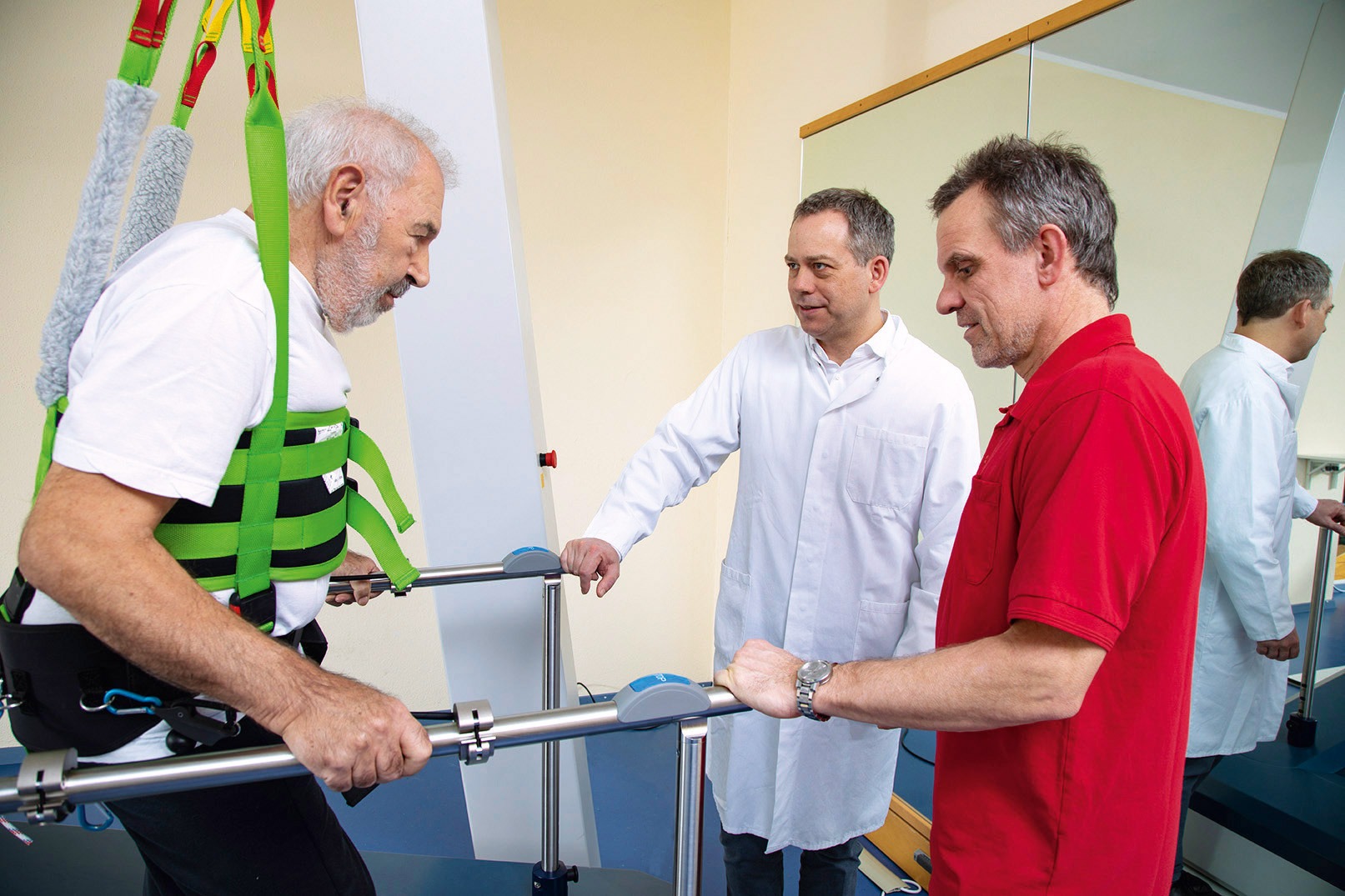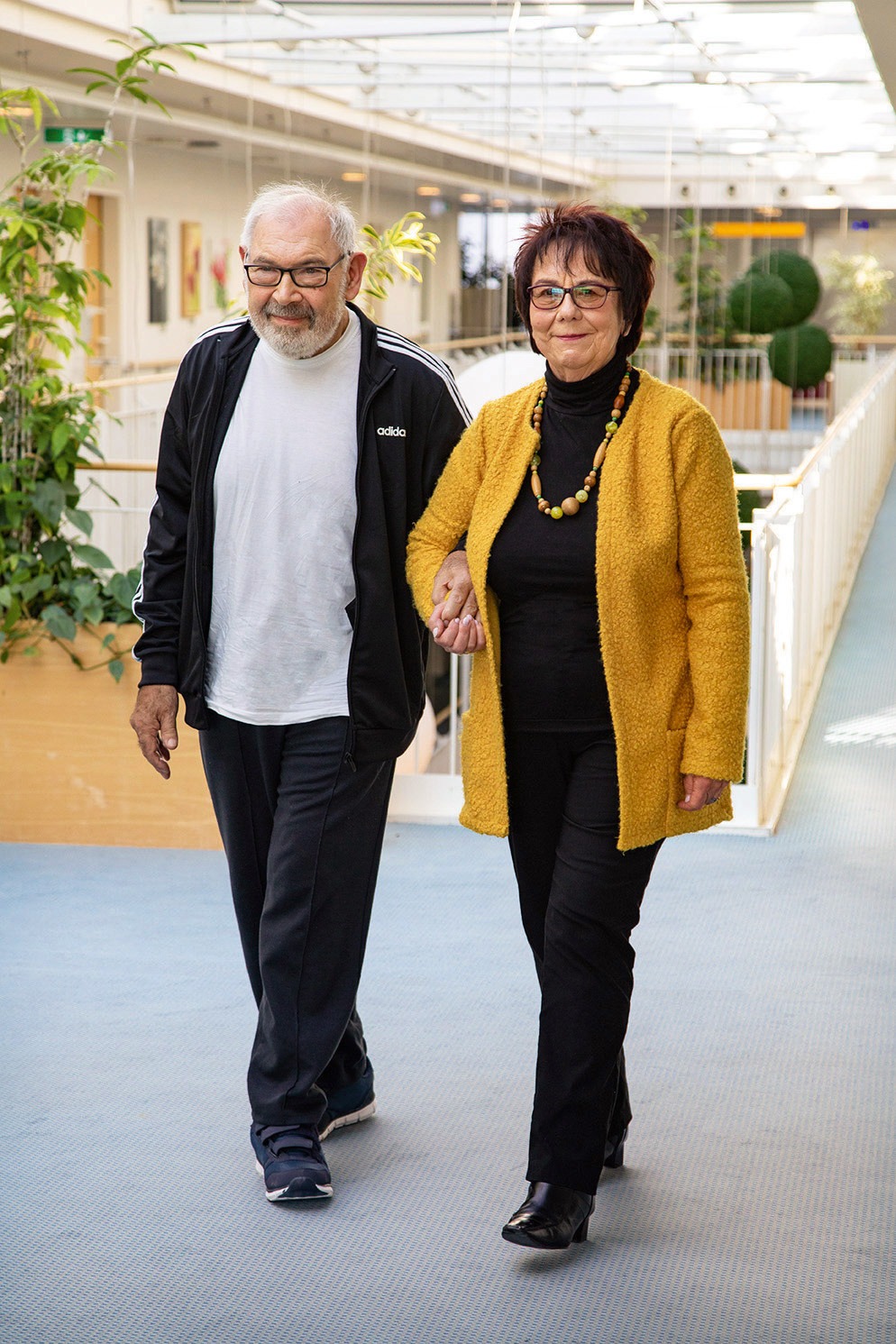
THERAPY-Magazin
Standing on both feet
After a life-altering misdiagnosis, Friedrich Huber relearned how to walk using the lyra end effector gait trainer at Passauer Wolf. A story of determination, innovation, and rehabilitation success.

Friedrich Huber
Patient at the Passauer Wolf Rehabilitation Center in Bad Gögging
A misdiagnosis in hospital would have left Friedrich Huber within an inch of being bedridden for life. But thanks to the courage and determination of his wife Hanni, he was transferred to Passauer Wolf Rehabilitation Centre where he regained his independence. With the new lyra end effector gait trainer, he learned how to walk again. And how to laugh.
Friedrich was completely unprepared. Although he had been diagnosed with Parkinson’s disease seven years ago and was already facing a number of restrictions, the fact that he was getting progressively weaker worried him a great deal. Small, everyday tasks progressively required more energy and he would break out in a sweat after just a few steps on the stairs. “One day, in September 2018, I collapsed while gardening. All of sudden, I couldn’t walk or stand!”
He was then rushed to the nearest hospital, his wife Hanni constantly by his side. This sentence will appear frequently in this article. In the end, it was down to the courage and energy of Friedrich’s wife that saved his life, so to speak. At least the kind of life that for Friedrich is worth living.
He was then rushed to the nearest hospital, his wife Hanni constantly by his side. This sentence will appear frequently in this article. In the end, it was down to the courage and energy of Friedrich’s wife that saved his life, so to speak. At least the kind of life that for Friedrich is worth living.
Four men with hats in the corner
Friedrich Huber: “I was a district manager for 40 years in the insurance industry and had private health insurance. This entitled me to treatment from a senior consultant. ‘He must be right’, I thought when I was diagnosed with a slipped disc.” Friedrich spent two weeks in hospital, but his condition didn’t improve. “It was like being permanently bedridden. I couldn’t do anything, I couldn’t go to the toilet, nothing. One day, fate took another turn on my rapidly deteriorating health when I started to have horrific visions.”
Friedrich suddenly had the feeling that the ceiling was coming towards him. Four men with hats in the corner of the room were sitting at a table in a threatening silence. “It was awful”, Friedrich recalls. “But I couldn’t turn round and I could barely speak. Sometimes I was freezing and other times I was sweating. And I didn’t want to keep ringing for the night nurse. And then these visions.” And again his wife Hanni was at his side. When Friedrich’s condition continued to deteriorate, Hanni had a bed put in the hospital room and helped her immobile husband with his nightly attacks of fear and pain. When she moved into the hospital with him, his mental state improved.
Friedrich Huber: “I was a district manager for 40 years in the insurance industry and had private health insurance. This entitled me to treatment from a senior consultant. ‘He must be right’, I thought when I was diagnosed with a slipped disc.” Friedrich spent two weeks in hospital, but his condition didn’t improve. “It was like being permanently bedridden. I couldn’t do anything, I couldn’t go to the toilet, nothing. One day, fate took another turn on my rapidly deteriorating health when I started to have horrific visions.”
Friedrich suddenly had the feeling that the ceiling was coming towards him. Four men with hats in the corner of the room were sitting at a table in a threatening silence. “It was awful”, Friedrich recalls. “But I couldn’t turn round and I could barely speak. Sometimes I was freezing and other times I was sweating. And I didn’t want to keep ringing for the night nurse. And then these visions.” And again his wife Hanni was at his side. When Friedrich’s condition continued to deteriorate, Hanni had a bed put in the hospital room and helped her immobile husband with his nightly attacks of fear and pain. When she moved into the hospital with him, his mental state improved.

After weeks in bed, Friedrich Huber quickly got into a wheelchair at the end of 2018. He learned how to walk again with the help of his wife Hanni (above) and therapy using the lyra end effector gait trainer.

Friedrich Huber exercising on the end effector gait trainer with physiotherapists Ms Eder and Mr el Fahem-Krummradt. He can manage up to 1,000 steps in 15 minutes of training.
Wrong diagnosis with consequences
Friedrich Huber: “Hanni didn’t let the matter rest. Nor did my daughter. Both wanted to know exactly why someone with a slipped disc should be delusional. Hanni repeatedly discussed the matter with the consultant, asking him to check me out again more thoroughly.” Hanni remembers: “Then the scales fell from my eyes. Perhaps it was a tick bite? We live at the edge of a forest. Ever since my husband’s been taking medication for Parkinson’s, the ticks seem to find him particularly irresistible. Not a week goes by without him coming home with a couple of ticks on his body.” After she’d explained this to the doctors, her husband was finally examined for tick-borne diseases.
Friedrich Huber: “Hanni didn’t let the matter rest. Nor did my daughter. Both wanted to know exactly why someone with a slipped disc should be delusional. Hanni repeatedly discussed the matter with the consultant, asking him to check me out again more thoroughly.” Hanni remembers: “Then the scales fell from my eyes. Perhaps it was a tick bite? We live at the edge of a forest. Ever since my husband’s been taking medication for Parkinson’s, the ticks seem to find him particularly irresistible. Not a week goes by without him coming home with a couple of ticks on his body.” After she’d explained this to the doctors, her husband was finally examined for tick-borne diseases.
Endless bad news
The diagnoses: Lyme borreliosis and tick-borne encephalitis (TBE), two diseases transmitted by ticks. “TBE caused the delusions. And Friedrich suffered from this viral disease despite the TBE vaccine.” His course of therapy was changed straight-away and after two weeks he was improving.
“You get antibiotics for Lyme borreliosis. I had a very high level of inflammation. But the body has to deal with TBE on its own. And I dealt with it,” Friedrich recalls. “Perhaps being bedridden for a long time and a lack of independence had made me overly sensitive, but I was terrified of being put out to grass at the age of 74,” he explains. “The next plan that the doctors had was that I should be transferred to the hospital’s geriatric department. Perhaps I had all the wrong ideas about it, but I was frightened I’d end up bedridden for the rest of my life.” Once again, his wife Hanni was at his side.
The diagnoses: Lyme borreliosis and tick-borne encephalitis (TBE), two diseases transmitted by ticks. “TBE caused the delusions. And Friedrich suffered from this viral disease despite the TBE vaccine.” His course of therapy was changed straight-away and after two weeks he was improving.
“You get antibiotics for Lyme borreliosis. I had a very high level of inflammation. But the body has to deal with TBE on its own. And I dealt with it,” Friedrich recalls. “Perhaps being bedridden for a long time and a lack of independence had made me overly sensitive, but I was terrified of being put out to grass at the age of 74,” he explains. “The next plan that the doctors had was that I should be transferred to the hospital’s geriatric department. Perhaps I had all the wrong ideas about it, but I was frightened I’d end up bedridden for the rest of my life.” Once again, his wife Hanni was at his side.
Rehabilitation not deterioration
“I was determined to get my husband into a rehabilitation clinic. I got on everyone’s nerves in the hospital for three days because the papers that would transfer him to the geriatric department had been completed. I wanted Friedrich to go to Passauer Wolf because I’d heard so many good things about it. Only two months earlier, he’d been busy in our garden and we’d celebrated our 50th wedding anniversary. This man was a classic case for rehabilitation.” The referring doctor finally changed the documents: transfer to Passauer Wolf Rehabilitation Centre in Bad Gögging. That was in October 2018. “Things were now looking up.”
“I was determined to get my husband into a rehabilitation clinic. I got on everyone’s nerves in the hospital for three days because the papers that would transfer him to the geriatric department had been completed. I wanted Friedrich to go to Passauer Wolf because I’d heard so many good things about it. Only two months earlier, he’d been busy in our garden and we’d celebrated our 50th wedding anniversary. This man was a classic case for rehabilitation.” The referring doctor finally changed the documents: transfer to Passauer Wolf Rehabilitation Centre in Bad Gögging. That was in October 2018. “Things were now looking up.”

Friedrich and Hanni Huber at Passauer Wolf. After eleven weeks, Friedrich was discharged.
Learning to speak and walk again
Hanni Huber: “All the staff from the senior physician to the cleaning lady were very friendly and welcoming from the word go. It’s just fantastic. When I asked if I could move in, Dr Wächter, the Head of Neurology, was very keen on the idea. He’s of the opinion that rehabilitation patients have better recovery outcomes if loved ones are present. That made us happy.” Friedrich was firstly lifted out of bed using a lifting device, dressed and then seated in a wheelchair so he could engage with the world again.
What’s more, Friedrich was the first patient to be treated with the newly acquired lyra end effector gait trainer. A state-of-the-art device that mimics natural step movements and helps patients learn to walk again. Friedrich spent eleven weeks at Passauer Wolf.
He learned to speak clearly again with his speech therapist Ms Schatz, and underwent psychotherapy and sports therapy. He also met Mr el Fahem-Krummradt and Ms Eder who work with patients using the lyra gait trainer. Friedrich Huber: “At first I walked using a walker. Each day I was able to take an extra step without assistance. Now I can walk independently again. Slowly but surely. Next up is the stairs. I want to do that on my own again. That’ll be for next time at Passauer Wolf.”
Hanni Huber: “All the staff from the senior physician to the cleaning lady were very friendly and welcoming from the word go. It’s just fantastic. When I asked if I could move in, Dr Wächter, the Head of Neurology, was very keen on the idea. He’s of the opinion that rehabilitation patients have better recovery outcomes if loved ones are present. That made us happy.” Friedrich was firstly lifted out of bed using a lifting device, dressed and then seated in a wheelchair so he could engage with the world again.
What’s more, Friedrich was the first patient to be treated with the newly acquired lyra end effector gait trainer. A state-of-the-art device that mimics natural step movements and helps patients learn to walk again. Friedrich spent eleven weeks at Passauer Wolf.
He learned to speak clearly again with his speech therapist Ms Schatz, and underwent psychotherapy and sports therapy. He also met Mr el Fahem-Krummradt and Ms Eder who work with patients using the lyra gait trainer. Friedrich Huber: “At first I walked using a walker. Each day I was able to take an extra step without assistance. Now I can walk independently again. Slowly but surely. Next up is the stairs. I want to do that on my own again. That’ll be for next time at Passauer Wolf.”
Ambulante Rehabilitation
Fachkreise
Gait
lyra
Patienten & Angehörige
Produkte
Stationäre Rehabilitation
Therapy & Practice
THERAPY 2020-I
THERAPY Magazine

Friedrich Huber
Patient at the Passauer Wolf Rehabilitation Center in Bad Gögging
A misdiagnosis in hospital would have left Friedrich Huber within an inch of being bedridden for life. But thanks to the courage and determination of his wife Hanni, he was transferred to Passauer Wolf Rehabilitation Centre where he regained his independence. With the new lyra end effector gait trainer, he learned how to walk again. And how to laugh.
References:
Related contents
Find related exciting contents in our media library.
Mehr laden
This is not what you are searching for? Knowledge
Meet our specialists.
Are you interested in our solutions? Schedule a meeting with a Consultant to talk through your strategy and understand how TEHRA-Trainer can help you to advance rehabilitation.